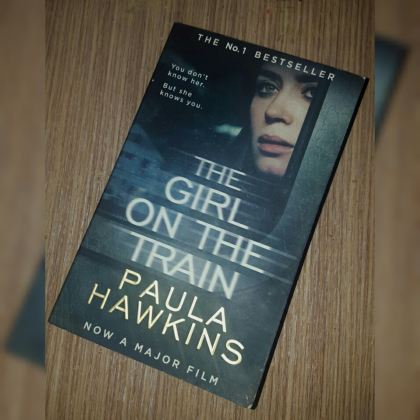
If you don’t mind sleepless nights; and days spent sitting at the edge of your seat, mind blown, with fists clenched, then this is the book for you. The trailer of the adapted movie is what compelled me to pick this book; turns out I made the right decision.
“The Girl On The Train” by Paula Hawkins is set in Ashbury, Witney and London, England, between the year 2012 and the summer of 2013. Rachel takes the train between Ashbury and London, pretending to still hold her job. Passing through the town of Witney, where she used to live with Tom, now her ex-husband, the train always stops across number twenty-three. There she watches a couple who live a few houses from her old home, where Tom has taken-in his former mistress as wife. She fantasizes about this couple’s perfect life—an obsession of some sort, not knowing what lies beyond. All their lives are to be entwined by tragedy.
“There’s nothing so painful, so corrosive as suspicion.” This book skilfully connects the dots between amnesia and memory formation— what you can remember and how others can influence it. The brilliant narrative is split into three voices: Rachel’s, Megan’s and Anna’s. Although young, Rachel suffers from blackouts—an unfortunate result of her heavy drinking. As normal, she wakes up from her blackouts with distorted memories; but this time around she can’t shake the feeling that something truly terrible happened the previous night. Rachel is undesirable not only for her drinking problem but her weight and depressive mood. Hence, Tom trades her for Anna— lively and easy on the eyes; but rather shallow. Megan is a troubled soul; chasing happiness, trying so hard to navigate through life. While she can be buoyant like Anna, she has the tendency to be obsessive like Rachel.
SIX LIFE LESSONS TO TAKE AWAY
- “Life is not a paragraph. And death I think is not a parenthesis.”— E.E. Cummings. In her first chapter, Hawkins gives this philosophical statement on life and death. Paragraphs are part of larger pieces of writing, an essay, a report, a book. Contrasting life to a paragraph gives the understanding that life is not simple and brief, in fact it is the most complex thing. We add parentheses, (), to give extra information to already complete sentences. Death is inevitable and not optional. Therefore, it’s not parenthetical.
- You “have to stop looking for happiness elsewhere”. You have to find a way of making yourself happy. To make a difference in your life, you must take charge of it. Too often we try to dry out the misery we feel inside with food, alcohol and other people. But they can never shine enough, and that misery never goes away. Happiness is a state of mind and to experience it you have to start with in.
- “…the holes in your life are permanent. You have to grow around them, like tree roots around concrete, you mold yourself through the gaps. Sometimes, not through our own faults, but the faults of others and the natural occurrence of things we find ourselves with a predisposition to fail. But that’s not true; it’s only true if you choose to believe that; don’t let your loss rob you of your life and aspirations . Instead, use it as an opportunity; to grow as a person; to better and strengthen yourself.
- “If I had been sober all these years, would I have known?” Alcohol to numb the pain can be a quick fix, but in the long term it robs us, causing even more problems and pain. And it’s not just alcohol. We often resort to bad habits to hide from what truly troubles us, scared into a hole like little mice. But the problems never really go away. Therefore, is necessary to change our bad habits for the good of our own well-being.
- ”If he does it with you, he will do it with someone else.” This is often true. Many people who get involved in affairs, when chosen over spouses, think they are the special one, possessing the ability to change the cheater— to make them commit. But, the truth is: if they are brave enough to cheat with you, they are brave enough to cheat on you.
- If you “do everything right, then nothing can go wrong. Or if it does, it cannot be your fault.” You cannot always be right, but you can give your all in everything you do. By doing so you free yourself from blame and torture, in the form of ‘what ifs’ and ‘I should have tried harder’. You have done the best you can, nothing else matters; if you fail, you can always get back up and achieve even more.
You must “trust yourself to do the right thing.” It is very important you do; lest you live your whole life in fear, looking over your shoulder, wondering if you’re leading yourself the right way.

I love the summary, now I want to read the book and great take away messages too!! You have a gift!
LikeLike
Thank you.
LikeLike